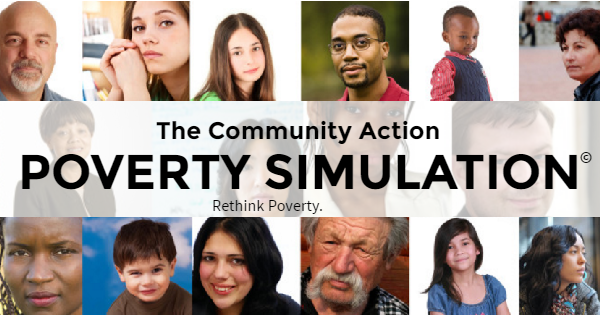
Frequent visitors of this site are deeply committed to helping those who suffer poverty and are committed to a systemic change approach that goes beyond handouts. At the same time it might be that despite good will, not all have personal experience of what it is like to feel ground down in a system.
Poverty is a reality for many individuals and families. But unless you have personally experienced poverty, it’s difficult to truly understand.
What does it really feel like to be:
- A single parent with limited resources and no transportation that must find a way to get to work and get their child to daycare.
- An elderly person that must find a way to pay for both utilities and medication.
- A young adult that must care for siblings while their parent is incarcerated.
- An elderly couple that must raise their grandchildren and deal with their own health and employment issues.
How can those of us who live relatively secure lives can have any idea of what it feels like? One of the key elements in a systemic change approach is understanding the wider context or system.
Many collegians today have vicariously experienced these situations through “urban plunges” – week-long immersion experiences and contact with just such real people. They often report it was a life changing experience.
CEO’s in Australia and other parts of the world will sleep out in the cold for just one night as part of fund-raising efforts. They too report that turns out to be more than a fund-raising experience.
Most of us are not CEO’s and have long ago seen our high school or college years in the rear view mirror. Is there some way adults can taste the experiences of poverty.
There is! “Poverty simulations.” In such well-organized experience, participants become swept up in the struggles they never knew.
The result is often expressed along these lines:
- “I really felt the stress of being poor and overwhelmed.”
- “I had no idea how under-educated I was on this subject.”
- “It makes me want to learn more about helping the community”
Poverty is often portrayed as a stand alone issue – but simulations allow individuals to walk a month in the shoes of someone who is facing poverty and realize how complex and interconnected issues of poverty really are.
One such program is the Community Action Poverty Simulation (CAPS), a profoundly moving experience. The experiences move people to think about the harsh realities of poverty and to talk about how communities can address the problem. Most importantly, it moves people to make a difference.
Living a Month in Poverty… The simulation involves participants who take on the roles of members of up to 26 families, all facing a variety of challenging, but typical, circumstances.
To start the simulation exercise, each family is given a card explaining its unique circumstances. It is then the families’ task to provide food, shelter, and other basic necessities by accessing various community resources during the course of four 15-minute “weeks.”
In addition, about 20 volunteers – preferably people who have experienced poverty – play the roles of resource providers in the community. This allows individuals who have first-hand knowledge of poverty to bring their perceptions to the exercise.
The Community Action Poverty Simulation is conducted in a large room. Participants are seated in family groups and community resources are located at tables around the perimeter of the room. The facilitator opens the simulation with an orientation to the activity, goes over ground rules, and answers participant questions during the exercise.
The activity lasts about three hours. This time frame includes an introduction and briefing by the facilitator, the simulation exercise, and a guided debriefing in which participants and volunteers share their observations and insights from the activity.
Visit the website of the Missouri Community Action Program to learn more about the program. They offer an amazing well-developed program that addresses the need to have a taste of what people go through on a daily basis.





0 Comments